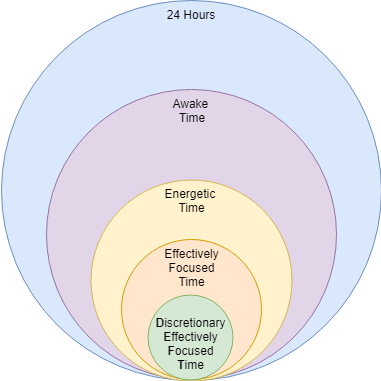I used to feel that Time was the most valuable commodity I possessed. The reasoning is simple, seductive and often repeated. When this idea is tossed around in popular culture, it really seems to mean “Time is the most unchangable resource used for moving toward your goals.” It makes sense right?, because you can’t control your spend rate - it goes out the door at 60 seconds to the minute, 24 hours to the day.
One morning I woke up and realized my sleep time is not available to me to apply to my goals. (Yeah, self-evidential Eurekas are that sort of paradox) This got me wondering whether there were other natural limits to my usable time that I wasn’t immediately grasping?
To this day, I am a personal productivity geek who enjoys books on time perception and tracks every minute of my professional work activities, yet I have come to believe that time itself is NOT my most precious resource…
It is obvious to most that only “awake time” can be leveraged to be productive toward our goals. While sleep is a critical to recharge, it can’t be used to move toward a given goal. While I don’t agree, there are some time management zealots who will tell you to get less sleep so that you can be more productive. Whatever the amount you of awake time I have, it must be acknowledged that awake time is my most limited resource.
Hmmmmm…. another thought - within my awake time I am sometimes tired - with little to no effectiveness toward accomplishing goals. So maybe the the most precious resource is Energetic Time? While humans vary greatly in the amount of their awake time they have energy for, we aren’t generally very good at pursuing objectives when were are pooped.
But “Energetic time” isn’t completely available to me either. There are a bunch of small, boring tasks in life like getting ready, commuting, eating, bathroom breaks, etc that take away another slice of energetic time over which I don’t have control. So maybe the answer is the subset of “Discretionary Energetic Time” - the time I have energy and can truly decide what to use it for.
But wait… even when I have “Discretionary Time” (in which I also have energy), there are a raft of required things that can make me unable to focus on goals.
It is well known that every individual has a limited amount of mental “executive function” time. You literally run out. When you run out depends on your individual biology, the frequency and intensity of recent demands on this time and factors like stress that eat away at this time with no valuable outcomes.1
We have demands on this time that do require “focus” but are not under our control - for example driving and making small daily decisions.
So maybe the most precious resource I possess is the “time that I can effectively focus for that I can also use for something I choose”.
So it would be my Discretionary Effectively Focused Time or DEFT. Sorry, I work in technology and A Clever Ruse Of Nudging Your Memory is always at the tip of my mind ;)

That’s Much Worse!
The reality of time as your most precious resource, is that the actual portion that is precious is much smaller than your total time.
Am I the bearer of bad news or what?
A well known proverb says that knowing truth will set you free - but it does not say that the truths that set you free will all be happy ones.
Knowing this particular truth will set you free from getting on a hampster wheel of optimizing the wrong types of time. How do I know? I’ve simply run too many miles on the hamster wheels of misguided time management :)
Let’s take a more critical look at this idea.
Deft Optimization
A very common mistake in attempting to manage time is to maximize total discretionary time so that more time is theoretically available for accomplishing goals. This idea rides on the assumption that all discretionary time can be made effective for accomplishing goals.
This can result in a savage slashing of all non-goal oriented activities or the elimination of activities that are uninteresting. In the short term this can create some gains in discretionary time which might translate to an increase in DEFT. However, carelessness in this approach can also compromise the balances of life that enable discretionary time to be effectively focused. Thinking in terms of DEFT shines light on the myth that if you had 10 more hours a day - you could harness them all toward your goals.
Working in IT, I have to counter-test code I build to see if it not only produces the desired actions in expected conditions, but also performs when the opposite of those conditions exist.
If I were to counter-test the idea of Discretionary Effective Focused Time - what would I find? Does it explain and account for my other experiences of spending time that are not about “being effective in moving toward a set of goals”? Does it help explain my interactions with others? Does it correlate to other wisdom about productivity, time and resource management?
Let’s test it.
DEFT-ly Balancing Work and Life
To me DEFT helps add balance, because if I stretch my health too far to “get more time” it usually has the counter effect of reducing my ability to focus during that bigger block of raw time - I have more minutes, but they are each less effective. It also helps balance where I spend my effective focused time - if I give it all to task oriented work and that leaves my relationships in a lurch - I am again headed for an unsustainable place.
DEFT-ly Balancing Tactical and Strategic Actions
If I spend too much of my DEFT on execution and only have residual raw time for planning - then I get a lot of things done - but increase the chances that I am not getting the right things done because I don’t spend DEFT on strategy. Many time management books discuss the need to take the few minutes of planning time you can squeeze out (initial DEFT creation) and do some strategic planning. The net result is fewer fires and potentially more DEFT.
DEFT-ly Enabling The Full Range of Cognition
Not all parts of your mind work best under the rigors of hyper-focus. Most notably, creative connections are known to come at defocused, slow times. Some things need multiple thinking times over the course of days to become the richest version of themselves - I experience this frequently with challenging technical problems that stretch my ability to innovate. My mind re-visits them at random times, like a child playing with blocks on and off throughout the day. Essentially, this natural behavior of our minds argues that intentionality is not the only mode of being that generates valuable cognition and insights. So cycles of time that lack significant intentionality (goal drivenness) are productive and valuable to the periods of strong intentionality.
DEFT-ly Recharging
Humans are cyclic beings. We need recharge cycles between exertion cycles. And it’s not just a need, cycling is a known way of increasing capacity - something that is proven by the ever effective High Intensity Interval Training (HIIT) approach to fitness training.
DEFT-ly Building Reserves
In order to operate at a peak capacity like DEFT, we must have a reservoir of capacity to tap into. Creating the reservoir takes… time. Staying fit, sufficient sleep and adequate nutrition are all part of the puzzle and the needs for these things are individual and vary throughout life’s seasons.
DEFT-ly Abiding by the 80 / 20 Principle
DEFT also fully acknowledges Pareto’s law in that paying attention to creating and allocating DEFT is likely to yield much greater results than efforts at optimizing the rest. Optimizing the rest might be required to expand DEFT - but the focus of that effort is on DEFT, not a blind faith that managing the whole will automatically result in higher effectiveness.
DEFT-ly Understanding Others
A DEFT model also helps individuals with compromised health or extenuating time pressure circumstances or changes due to aging to gain control and feel good about how to spend effective focused time. A focus on DEFT can facilitate team work between individuals and teams that have differing natural levels of DEFT. In my profession I see that Operations teams generally have less DEFT - and those teams who have more can help by using some of theirs. Agile development acknowledges and allows for the fact that different people work at different speeds - some of this difference may be attributed to differing natural levels of DEFT.
DEFT is Variable and Changable
Unlike your 24 hours a day, DEFT has some flexibility to be expanded - because it is a subset of raw time. This is good news because it offsets the false pressure created by the truth that 24 hours a day cannot be expanded. The core problem comes in focusing on the unchangable 24 hours as the main target of time management. Oversimplifying that the total possible DEFT is simply a function of freeing up other time - in reality there is a maximum DEFT that is much less than your total available time and optimizing it looks very different than simply slashing all “non essentials”.
24 Hours of DEFT or Bust!
At this point you might be wondering - How do I make 100% of my time into discretionary effectively focused time? The answer is both “you can’t” and “you shouldn’t want to”. The above correlations of DEFT to other realities should serve as fair warning that you are designed to need and enjoy multiple modes of being in regard to time - some brim with intentionality, others do not.
However, you can flip this 100% formula on it’s head and say something like “I want 100% of my work time to be DEFT.” That vision might lead you to SHRINK your work to fit into your DEFT Perhaps you would come up with something like a 4 hour work week? ;)
Is DEFT a New Idea?
Although I’ve spun a term and an acronym to try to help you remember this important idea, the underlying concept of DEFT is woven into so much wisdom about time and resource management. Unfortunately, it is frequently an undertone that is easy to miss. Read between the lines and you will start to see it everywhere!
P.S. Time Geeks Get More Than 24 Hours a Day (or Less if They Want to)
Throughout this post I have acknowledged that time passes at the same rate for everyone. Yet we’ve all had the feeling of time flying or time dragging. What if you could manipulate your own sense of the passage of time? It could allow you slow down for the good stuff and speed up the uninteresting.
The book “The Power of Time Perception: Control the Speed of Time to Make Every Second Count” suprisingly starts with the hardcore neuroscience of the physical brain that functions as the baseline for our perception of time. It then goes on to talk about how we might take actions to speed up or slow down these perceptions.
Interestingly, your perception of reality has a big effect on your actual feelings of well being and physical well being - so time-perception management can make you feel like you are squeezing more life out each moment.
The Power of Time Perception: Control the Speed of Time to Make Every Second Count

